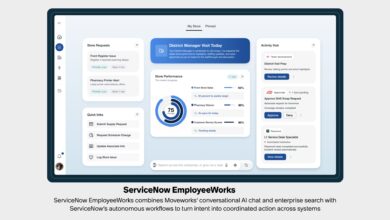UAE Leads Global AI Shift with Rise of Chief AI Officers, Study Finds

A new global study by the IBM Institute for Business Value (IBV), conducted in collaboration with the Dubai Future Foundation (DFF), indicates the United Arab Emirates (UAE) is at the forefront of a global trend in appointing Chief AI Officers (CAIOs) to spearhead enterprise-wide AI strategy and execution. The study, which surveyed over 600 CAIOs across 22 countries and 21 industries, reveals that 33% of organizations in the UAE have appointed a CAIO, compared to 26% globally.
This suggests a strong commitment to AI leadership within the UAE. Organizations with a CAIO globally see a 10% higher return on investment (ROI) on AI spending, and those where CAIOs manage a centralized or hub-and-spoke AI operating model can achieve a 36% higher ROI on AI initiatives. The report’s foreword, written by His Excellency Omar Sultan Al Olama, UAE Minister of State for Artificial Intelligence, Digital Economy and Remote Work Applications, emphasizes AI’s role as a “force multiplier for nations” and positions the CAIO as a “translator between vision and execution”.
He states, “AI is not a singular breakthrough, it’s ten thousand small shifts. It’s cultural. It’s institutional. It’s a habit. The CAIO will be the one pushing that habit forward – across public administration, healthcare, education and logistics. More than a technologist, the CAIO is a translator between vision and execution, a bridge between strategy and science, and a steward of value across the enterprise.”
The study also incorporates insights from leading UAE entities like the Roads and Transport Authority (RTA) and Dubai Customs, offering a multi-sector perspective on AI leadership.
Saeed Al Falasi, Director of the Dubai Center for Artificial Intelligence, commented, “Dubai’s early adoption of the Chief AI Officer role reflects our national commitment to a responsible, future-ready government.” He added, “This study reinforces that CAIOs are strategic enablers and catalysts that drive the city’s vision for the future. By empowering these leaders with the right tools, we are setting the stage for scalable, measurable AI impact across key sectors in Dubai.”
Shukri Eid, VP and GM, IBM Gulf, Levant and Pakistan, noted, “The UAE is setting a global benchmark by embedding Chief AI Officers within organizations, ensuring AI is a strategic enabler across sectors. This is a testament to the nation’s foresight in shaping a future-ready economy.” Eid also stated, “As we continue our collaboration with the Dubai Future Foundation, IBM remains committed to helping organizations scale their AI capabilities to drive measurable, long-term impact.”
Lula Mohanty, Managing Partner, Middle East and Africa, IBM Consulting, remarked, “By appointing CAIOs early and giving them visibility and budget control, UAE organizations have laid a strong foundation for enterprise AI.” Mohanty concluded, “The next step is execution, moving beyond pilots, embedding AI into core business functions and delivering measurable ROI. IBM is proud to partner with UAE clients on this next phase of their AI journey.”
UAE CAIOs demonstrate stronger leadership support compared to their global counterparts. Ninety percent of UAE CAIOs report sufficient CEO support, compared to 80% globally. Additionally, 86% of UAE CAIOs indicate broader C-suite support, versus 79% globally. A notable 69% of UAE CAIOs were appointed internally, in contrast to 57% globally, reflecting an emphasis on developing AI leadership from within.
UAE CAIO roles typically come with broader mandates and implementation responsibilities. Seventy-nine percent of UAE CAIOs control their organization’s AI budget, compared to 61% globally. Furthermore, 62% of UAE CAIOs prioritize building business cases for AI, while only 45% do so globally. Fifty percent of UAE CAIOs consider direct AI implementation a primary responsibility, aligning with 48% globally, although 38% of UAE CAIOs find implementation very difficult, compared to 30% globally.
The career backgrounds of UAE CAIOs suggest a focus on data and operations. Sixty-nine percent of UAE CAIOs have a background in data, similar to 73% globally. Forty-eight percent of UAE CAIOs have focused on operations, compared to 38% globally, indicating a pragmatic, execution-oriented leadership profile.
While UAE CAIOs acknowledge the importance of measuring AI outcomes, they also demonstrate a willingness to initiate projects without perfect metrics. Seventy-six percent of UAE CAIOs believe their organizations risk falling behind without AI impact measurement, compared to 72% globally. Yet, 74% of UAE CAIOs agree they initiate AI projects even if they cannot measure their effects, compared to 68% globally.
Despite significant leadership investments, many UAE organizations remain in the early phases of AI deployment. Seventy-six percent of UAE organizations are still in pilot stages with limited deployment, compared to 60% globally.
The study, conducted by the IBM Institute for Business Value (IBM IBV) in collaboration with Oxford Economics and The Dubai Future Foundation, surveyed CAIOs or equivalent roles in the first quarter of 2025. It examined the role, responsibilities, and challenges of CAIOs, covering aspects such as the origin of the position, career backgrounds, perceptions of influence and challenges, team structure, and key responsibilities. The study also assessed AI initiative performance, impact measurement, organizational strengths in AI governance, and areas for improvement.




